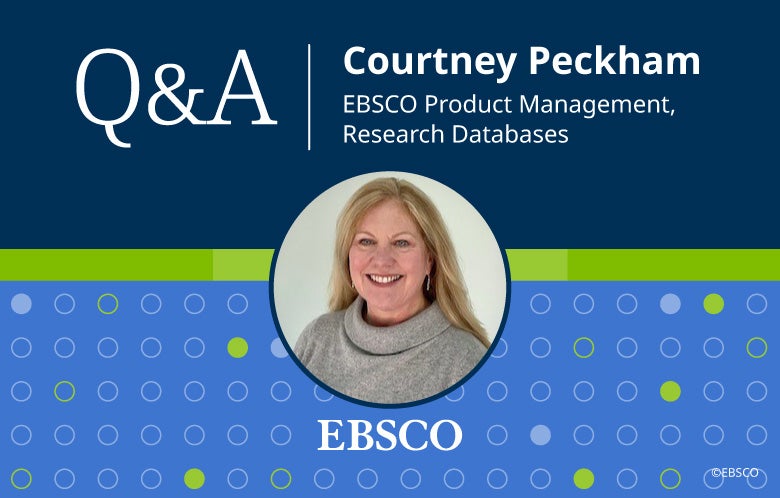As incorporating diversity into our core values becomes increasingly important, we asked EBSCO Information Services' Courtney Peckham, EBSCO Product Management, Research Databases, to discuss the ways EBSCO is incorporating the values of diversity, equity and inclusion in library products and services.
What can you tell us about the increasing importance of diversity, equity and inclusion resources in libraries?
EBSCO’s research has shown that diversity, equity, and inclusion are vital to libraries and the populations they serve for three fundamental reasons. First, students/scholars want to be able to access research material on vulnerable or underserved groups that are authored or created by members of those groups. The second consideration is that libraries need to make sure that their patrons feel represented by including authors and research materials that reflect the diversity of the population they serve. Finally, it is imperative that libraries provide access to diverse content in order to broaden users’ perspectives by providing a variety of points of view.
How is EBSCO addressing the issue of diversity, equity and inclusion through product offerings?
EBSCO is conducting diversity audits on our products and modifying our curation strategies to ensure inclusive content. We are also updating outdated terminology in subject headings and adding new local terminology such as Aboriginal Canadians, First Nations of Canada, First Nations of Australia, and Torres Strait Islanders. We have established a “sensitive term review” that ensures we are equitably indexing race, gender, and other factors. It’s also important to note that we are committed to understanding the varying needs of our customers by using diverse personas such as global user, immigrant, international student, and by using accessibility personas, such as low vision, dyslexic, deaf, and others.
EBSCO is conducting diversity audits on our products and modifying our curation strategies to ensure inclusive content.
EBSCO is conducting diversity audits on our products and modifying our curation strategies to ensure inclusive content.
Explain the need for separate ethnic or gender studies databases as you expand existing databases to incorporate DEI content.
EBSCO has long supported subject-specific research by offering products in many different disciplines, from applied sciences to the arts and humanities. An excellent example is EBSCO’s LGBTQ+ Source, a widely respected and authoritative resource for LGBTQ+ studies that supports curricula in gender, sexuality, queer theory, and related subjects. As the study of cultural and ethnic diversity is emerging as an area of study–and in some cases, a requirement–in many colleges and universities, we released Ethnic Diversity Source in 2020 to meet a growing need identified by our customers. It allows students and scholars to search a curated collection of relevant material in this specific subject area and draws from diverse content types such as research articles, biographies, and primary sources. Our customers appreciate having the option to purchase these specialized resources.
We do recognize that there is a need to surface diverse content on all products, and we are investigating how best to accomplish that, including adding new indicators and limiters to our products.
What are EBSCO’s future plans for further expanding resources to be more inclusive?
In addition to the efforts described above, EBSCO has created a Diversity, Equity, and Inclusion Committee to steer the company’s DEI activities. Among our initiatives are the development of a comprehensive style guide that will standardize language and subject headings across product lines. Another top priority is updating our databases to eliminate non-inclusive terms and to adjust terms relating to people and groups.



